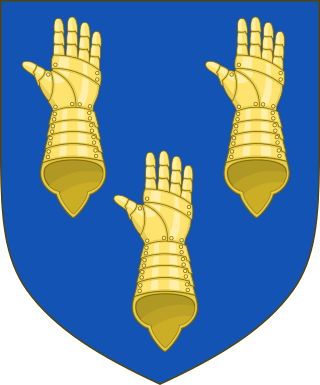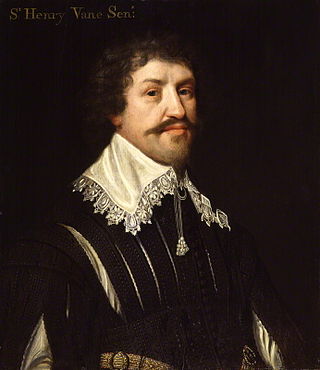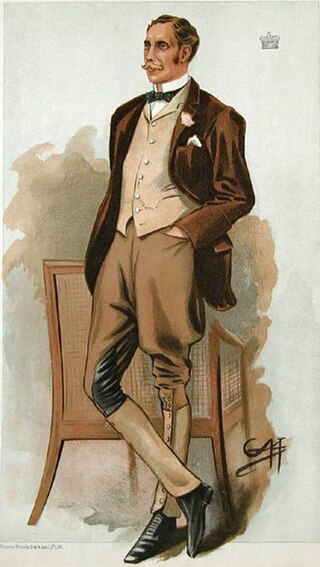Related Research Articles
Henry Vane is the name of:

Marquess of Londonderry, of the County of Londonderry, is a title in the Peerage of Ireland.

Baron Barnard, of Barnard Castle in the Bishopric of Durham, is a title in the Peerage of England. It was created in 1698 for Christopher Vane, who had previously served as a member of parliament for County Durham and Boroughbridge. Vane was the son of Sir Henry Vane the Younger and grandson of Sir Henry Vane the Elder. His grandson, the third Baron, notably served as Paymaster of the Forces and as Lord Lieutenant of County Durham. In 1754 he was created Viscount Barnard and Earl of Darlington, both in the County Palatine of Durham. Lord Darlington was the husband of Lady Grace FitzRoy, daughter of Charles FitzRoy, 2nd Duke of Cleveland, the illegitimate son of King Charles II by his mistress Barbara Villiers, 1st Duchess of Cleveland.

Duke of Cleveland was a title that was created twice, once in the Peerage of England and once in the Peerage of the United Kingdom. The dukedoms were named after Cleveland in northern England.

David George Brownlow Cecil, 6th Marquess of Exeter, KCMG KStJ, styled Lord Burghley before 1956 and also known as David Burghley, was an English athlete, sports official, peer, and Conservative Party politician. He won the gold medal in the 400 m hurdles at the 1928 Summer Olympics.

Raby Castle is a medieval castle located near Staindrop in County Durham, England, among 200 acres (810,000 m2) of deer park. It was built by John Neville, 3rd Baron Neville de Raby, between approximately 1367 and 1390. Cecily Neville, the mother of the Kings Edward IV and Richard III, was born here. After Charles Neville, 6th Earl of Westmorland, led the failed Rising of the North in favour of Mary, Queen of Scots in 1569 Raby Castle was taken into royal custody. Sir Henry Vane the Elder purchased Raby Castle in 1626 and neighbouring Barnard Castle from the Crown, and the Earls of Darlington and Dukes of Cleveland added a Gothic-style entrance hall and octagonal drawing room. From 1833 to 1891 they were the Dukes of Cleveland and they retain the title of Lord Barnard. Extensive alterations were carried out in the 17th and 18th centuries. It is famed for both its size and its art, including works by old masters and portraits. After 1733 it was frequented from his young age of eleven by the poet Christopher Smart, who eloped briefly at the age of thirteen with Anne Vane, daughter of Henry Vane, who succeeded to the Barnard title. It is a Grade I listed building and open to the public on a seasonal basis.

Staindrop is a village and civil parish in County Durham, England. It is situated approximately 6 miles (9.7 km) north east of Barnard Castle, on the A688 road. According to the 2011 UK Census the population was 1,310, this includes the hamlets of Cleatlam and Killerby.
Henry John Neville Vane, 11th Baron Barnard, was a British peer, the son of Christopher Vane, 10th Baron Barnard.

Christopher Vane, 1st Baron Barnard was an English peer. He served in Parliament for Durham after his brother, Thomas, died 4 days after being elected the MP for Durham. Then, again from January 1689 - November 1690 for Boroughbridge. He served in the Commons as a Whig collaborator during the passage of the Bill of Rights which his father, Sir Henry Vane, the Younger had fought for religious and civil liberty before his beheading in 1662. He is known for his disputes with his heirs and for employing Peter Smart, father of the poet Christopher Smart, as a steward.

Henry Vane, 1st Earl of Darlington, PC, known as Lord Barnard between 1753 and 1754, was a British politician who sat in the House of Commons from 1726 to 1753 when he succeeded to a peerage as Baron Barnard.

William Henry Vane, 1st Duke of Cleveland, KG, styled Viscount Barnard until 1792 and known as The Earl of Darlington between 1792 and 1827 and as The Marquess of Cleveland between 1827 and 1833, was a British landowner, slave holder and politician.

Henry Vane, 2nd Earl of Darlington was a British peer.

Harry George Powlett, 4th Duke of Cleveland, styled The Honourable Harry Vane until 1827 and Lord Harry Vane from 1827 to 1864, who in 1864 adopted by Royal Licence the surname and arms of Powlett in lieu of Vane, was an English landowner, diplomat and Whig statesman. During the crisis which led to the collapse of Lord Russell's government in 1866 over the question of parliamentary reform, he was considered a possible compromise prime minister in a Whig-Conservative anti-reform coalition government, but such plans came to nothing.

Sir Henry Vane, the elder was an English politician who sat in the House of Commons at various times between 1614 and 1654. He served King Charles in many posts including secretary of state, but on the outbreak of the English Civil War joined the Parliamentary cause. He was the third cousin of Francis Fane, 1st Earl of Westmorland.

Henry de Vere Vane, 9th Baron Barnard FSA, JP, Hon. DCL was a British peer and Senior Freemason.
Christopher William Vane, 10th Baron Barnard was a British peer and military officer.
Major Hon. Henry Cecil Vane was the son and heir apparent of Henry de Vere Vane, 9th Baron Barnard of Raby Castle. He was wounded in World War I and died of those wounds shortly after, leaving his younger brother, Christopher Vane, 10th Baron Barnard as heir to the Raby estates.
William Vane, 1st Viscount Vane, of Fairlawn, Kent, was a British Whig politician who sat in the House of Commons between 1708 and 1734.
Raby Vane was a Royal Navy officer and Member of Parliament, a younger son of Henry Vane, 1st Earl of Darlington.
Elizabeth Vane, Lady Barnard, formerly Lady Elizabeth Holles was an English noblewoman, the wife of Christopher Vane, 1st Baron Barnard. Her disputes with her family led to a noted court case, and her ghost is reputed to haunt Raby Castle, near Durham.
References
- ↑ "Tributes paid to Lady Davina Barnard, who died aged 87". The Northern Echo. Retrieved 17 August 2020.
- ↑ "Lord Barnard shares vision for future of Raby Estate and castle". The Northern Echo. Retrieved 17 August 2020.
- ↑ Priestley, Catherine (18 January 2017). "New boss appointed to establish and safeguard the Raby Estate business, in County Durham and Shropshire, for future generations". The Northern Echo. Retrieved 17 August 2020.
- ↑ "Hall left empty for years may be turned into luxury apartments". Darlington and Stockton Times. 3 October 2008. Retrieved 17 August 2020.
